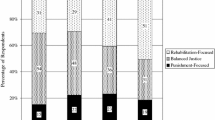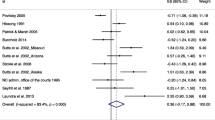Abstract.
Assuming a risk of innocent conviction and fully rational individuals, the current study addresses the effects of immediate punishment and probation rules. Strict dominance of a probation rule requires that the judicial system is highly unreliable and, at the same time, learning over criminal careers is strong. Else, an optimal punishment scheme can always be based on either regularly offering probation or appropriate immediate punishments.
Similar content being viewed by others
Author information
Authors and Affiliations
Additional information
Received: July 2000 / Accepted: November 2001
RID="*"
ID="*" The authors gratefully acknowledge valuable comments by three anonymous referees and the US co-editor of the journal.
Rights and permissions
About this article
Cite this article
Fabel, O., Meier, V. Rational probation decisions for juvenile delinquents. Econ Gov 3, 249–274 (2002). https://doi.org/10.1007/s101010100044
Issue Date:
DOI: https://doi.org/10.1007/s101010100044




